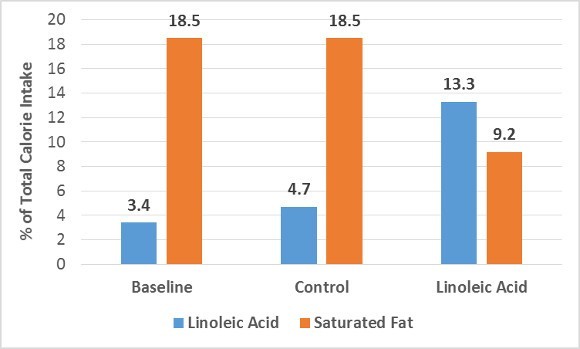It’s been suggested that replacing dietary saturated fat with linoleic acid may reduce the risk of heart disease and early death.
Recently, researchers used unpublished data from the ’60s and ’70s to test this theory. They also conducted a review and meta-analysis of more recent studies.
Here is a detailed summary of their results.
Background
According to the traditional diet-heart hypothesis, reducing circulating cholesterol by eating a diet high in omega-6 linoleic acid — rather than saturated fat — may reduce the risk of heart disease and death.
Pieces of this hypothesis are supported by randomized controlled trials. They showed that replacing saturated fat with linoleic acid reduced total circulating cholesterol, including LDL-cholesterol.
Observational studies have also shown that high levels of cholesterol are associated with an increased risk of heart disease and death.
However, association does not equal causation. And so far, no randomized controlled trials have shown that replacing saturated fat with linoleic acid reduces the risk of heart disease events or death.
In fact, evidence points to the opposite — that replacing saturated fat with linoleic acid may increase the risk of heart disease events and premature death.
Recently, researchers using previously unpublished data from the Sydney Diet Heart Study (1966–73) showed that replacing saturated fat with vegetable oil, rich in linoleic acid, increased the risk of death from heart disease.
Yet, for decades, one of the main cornerstones of official dietary guidelines has been to reduce saturated fat and replace it with unsaturated fat, such as linoleic acid.
These guidelines may have contributed to the high intake of linoleic acid in the US today. It’s quite high, at about 7% of total calorie intake, on average.
In comparison, linoleic acid intake has been estimated to have been around 2–3% of calories 100 years ago, when people ate minimal amounts of processed foods.
Article Reviewed
A group of researchers used unpublished data from the Minnesota Coronary Experiment to test the traditional diet-heart hypothesis.
Re-evaluation of the traditional diet-heart hypothesis: analysis of recovered data from Minnesota Coronary Experiment (1968–73).
Study Design
This study was based on the Minnesota Coronary Experiment, a randomized controlled trial conducted from 1968–1973.
It tested whether replacing saturated fat with linoleic acid, a polyunsaturated omega-6 fat, would reduce the risk of coronary heart disease and death.
It’s the largest trial on the health effects of linoleic acid ever conducted, including a total of 9,570 people, aged 20–97. However, the current analysis used data for the 2,355 participants who received the experimental diets for a year or more.
The participants were patients in mental hospitals, but one nursing home was also included. The study length differed between participants, lasting for up to 56 months (4.7 years), depending on how long they were hospitalized.
Participants were randomly assigned to two diets:
- Linoleic acid: This diet increased linoleic acid intake (from corn oil) by 280%, from 3.4% to 13.2% of calories, on average. Saturated fat intake was reduced by 50%, from 18.5% to 9.2%, compared to the participants’ initial diets.
- Control diet: This diet did not change saturated fat intake, which was 18.5% of calories, on average. The linoleic acid content was increased by 38%, providing about 4.7% of calories.
The saturated fat and linoleic acid content of the two diets is presented below:

In addition to saturated fat, the control group’s diet contained considerable amounts of trans fat from margarine and shortening. The control diet was also 38% higher in linoleic acid, compared to the initial diet.
Using data from the start and end of the study, the researchers analyzed changes in circulating total cholesterol and the incidence of death.
They also used autopsies to detect heart disease. However, the researchers only managed to recover 51% of the 295 autopsy reports.
In addition to analyzing this data, the researchers did a systematic review and meta-analyses of all randomized controlled trials examining the health effects of lowering cholesterol by replacing saturated fat with linoleic acid.
Bottom Line: This study analyzed unpublished data from a large, randomized controlled trial examining how replacing saturated fat with linoleic acid affected cholesterol and the risk of death.
Finding 1: Linoleic Acid Reduced Cholesterol
A high-linoleic acid diet reduced total cholesterol by 13.8% or 31.2 mg/dL, on average. The control diet reduced total cholesterol only by 1% or 5 mg/dL.
When the participants were divided into subgroups based on age and gender, cholesterol reduced similarly within each of them.
Bottom Line: Increasing the dietary intake of linoleic acid significantly reduced the circulating levels of total cholesterol.
Finding 2: Linoleic Acid Did Not Reduce the Risk of Heart Disease
The study found no evidence that a diet high in linoleic acid reduced heart disease risk. In fact, excessive linoleic acid intake seems to have increased heart attacks.
According to autopsy reports, 41% of those who consumed high amounts of linoleic acid had signs of at least one heart attack, while only 22% of the control group did.
However, the incidence of clogged arteries was similar in both groups, and cholesterol reduction was not significantly associated with heart disease.
Additionally, only some of the autopsy reports were recovered in the current analysis.
Bottom Line: The study suggests that higher consumption of linoleic acid increased the risk of heart disease.
Finding 3: Cholesterol Reduction Was Linked With an Increased Risk of Death
The study showed that replacing saturated fat with linoleic acid was associated with an increased risk of death.
Specifically, each 30 mg/dL (0.78 mmol/L) reduction in total cholesterol led to a 22% higher risk of dying.
However, when age groups were analyzed separately, the association was only significant among those who were 65 years or older. In this subgroup, the risk of death increased by 35% for each 30 mg/dL reduction in total cholesterol.
In comparison, there was no significant association among those who were younger than 65 years.
In the early 1970s, these results conflicted with prevailing beliefs, probably explaining why the researchers decided not to publish the results.
Bottom Line: A reduction in cholesterol was associated with an increased risk of death.
What Do Observational Studies Say?
Observational studies are useful when randomized controlled trials are impractical or ethically unacceptable.
However, since they cannot identify causal relationships, their interpretation can often be misleading. For example, their findings may sometimes be opposite to the true causal association.
Observational studies have provided inconsistent results for the association of linoleic acid and heart disease.
A few studies have shown that self-reported intake of foods high in linoleic acid was associated with a lower risk of coronary heart disease.
Other studies found no significant associations.
Similarly, high circulating levels of linoleic acid have been linked with a lower risk of heart disease in some studies, but not all.
Bottom Line: Some observational studies suggest eating a lot of linoleic acid may reduce the risk of heart disease, whereas others found no link.
What Do Randomized Controlled Trials Say?
Randomized controlled trials are the only studies that can demonstrate a cause-and-effect relationship.
The systematic review identified only 5 randomized controlled trials that specifically examined the replacement of saturated fat with vegetable oils rich in linoleic acid.
All in all, these studies included a total of 10,808 participants. Compared to the control groups, a diet rich in linoleic acid reduced total cholesterol by 7.8% to 13.8%, on average.
When the results of these trials were combined in a meta-analysis, there was no evidence of any health benefits from consuming linoleic acid.
Bottom Line: Previous randomized controlled trials haven’t provided any evidence of benefits from increasing the intake of linoleic acid.
Why Doesn’t Linoleic Acid Have Benefits?
Linoleic acid is an essential amino acid that’s healthy in moderate amounts.
Since eating high amounts can reduce cholesterol, it may seem paradoxical that it doesn’t reduce the risk of heart disease in randomized controlled trials.
Although it is still not known why linoleic acid may be unhealthy in high amounts, there are a few ideas.
Higher linoleic acid intake increases the levels of oxidized linoleic acid in many body tissues. Oxidized linoleic acid has been associated with several chronic diseases, including heart disease.
However, high intake might only adversely affect those who have elevated linoleic acid oxidation — smokers, heavy drinkers, heart disease patients or elderly people — while not being as much of a concern for others.
Bottom Line: Why linoleic acid may be unhealthy in high amounts is not entirely clear, but it may increase oxidized linoleic acid levels for some.
Limitations
The Minnesota Coronary Experiment was designed well and is the largest study on the traditional diet-heart hypothesis. However, it also had a few limitations.
First, even though the current study used data from a randomized controlled trial, the findings linking cholesterol levels with death are observational.
Second, the study only measured total cholesterol. Other factors, such as LDL-cholesterol and HDL-cholesterol, are more closely associated with heart disease.
Third, the experimental diet contained twice as much linoleic acid as the average US diet. Only a small proportion of people reach the high levels examined in this study. It is unclear if lower amounts of linoleic acid have any adverse effects.
Additionally, the study was conducted in mental hospitals and nursing homes. The findings are not necessarily generalizable to healthy people.
Finally, this study and other previous studies have used concentrated vegetable oils high in linoleic acid. The results may not be generalized to nuts or other whole foods containing high amounts of linoleic acid.
Bottom Line: This study was well conducted but had a few limitations. The results may not necessarily be generalized to healthy people, normal intakes of linoleic acid or whole foods that are high in it.
Summary and Real-Life Application
In short, this study showed that replacing saturated fat with linoleic acid effectively lowered total cholesterol.
However, despite the significant cholesterol reduction, there was no evidence that linoleic acid reduced the risk of premature death.
The study even suggests that linoleic acid may increase the risk of death from heart disease for those who are 65 years of age or older.
Linoleic acid is an essential fatty acid and getting small amounts from the diet is healthy, but consuming too much of it is probably unhealthy. At the very least, replacing saturated fat with linoleic acid provides no health advantage.
If you wish to reduce the linoleic acid content of your diet, avoid vegetable oils high in linoleic acid. These include corn, soybean, sunflower, safflower and cottonseed oils.
